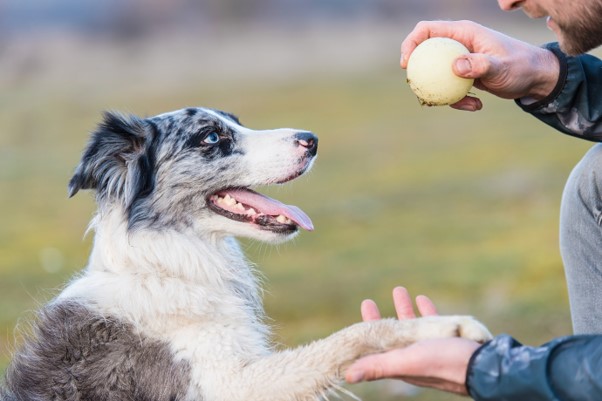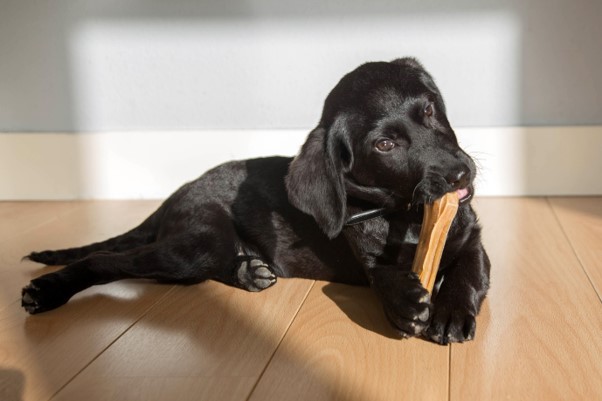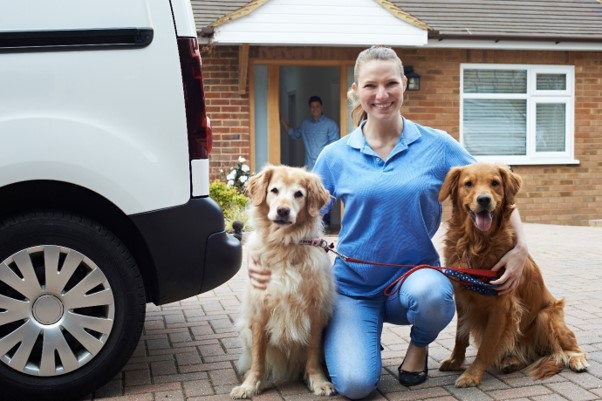This is actually a complicated question and it could be answered by saying ‘Never’!
Let’s start by thinking about what we mean by ‘obedience’. The dictionary defines it as ‘compliance with an order, request or law, or submission to another's authority’. So, does this mean that after our dog has been trained he/she is going to do exactly what we say, whenever we say it? All the time, every time? Is that realistic or fair? What if we want the dog to sit, but they have arthritis and very painful hips? Do we expect ‘obedience’ then? Also, saying that dogs will be ‘starting obedience training’ implies that they don’t learn anything until we make an effort to start getting them to ‘do what they are told’.
The whole concept of ‘obedience’ is outdated
We need to rethink the way we should be living with our dogs. Modern research has likened the role of an owner to their dog as one of caregiver, educator and guide, meaning they are responsible for helping their dog live in our world and for meeting their needs. This is very similar to the role parents have to their children. Generally, we don’t anthropomorphise, but there are some useful comparisons between dogs and children when it comes to their learning.
There used to be an old saying that dogs shouldn’t start obedience training until they were six months old. If we equate ‘obedience training’ to ‘formal education’, this means that parents would ignore their children’s behaviour until they are five and start school!
Bringing home your tiny new puppy is equivalent to having a new baby. Neither young creature has any idea of what you expect of them or how to behave in any situation. We are responsible for teaching them the skills they need to cope in the world - how to get along with others, how to deal with any situation, how to manage their frustration and how to fit into society.
.jpg)
With regards to canines, this is not ‘obedience training’ but the teaching of essential life skills, imparting knowledge and information to prepare them for future challenges, and it needs to start from the minute you bring them home. There are going to be boundaries, as there will be things they just can’t do (much as they would like to!) but learning what is not acceptable, as well as what is, is all part of these important life lessons.
So many dogs get relinquished to rescue centres because this valuable teaching was not done in the early months of puppyhood.
Dogs mature quickly and by six months you have an adolescent – a teenage hooligan, with rampaging hormones and growing independence. If no teaching has been done up to this point then it is going to be a very big challenge to attempt to impose some limitations now!
Teaching provides information. We must teach our dog life skills from the very beginning, using positive, reward-based methods. These have been proven to increase the bond between owner and dog, result in less problem behaviours and give the dog the confidence to think for himself/herself. We need to be incredibly consistent in our interaction and expectations of the dog, so that he/she can obtain the necessary information to begin to recognise what he/she needs to do (or not do) in every situation. Once the dog understands ‘how to learn’, force-free training will help him/her develop the skills to work out what behaviours are required in which contexts, instead of us having to constantly keep telling him/her what to do. Any behaviours you tolerate or encourage, even if only sometimes, will become part of your dog’s repertoire and appear even when you don’t want them. (How is your dog supposed to know the difference between jumping up when he/she is clean and dry and not jumping up when he/she is wet and muddy?) Inconsistent expectations from owners cause a lot of issues in dogs; they become very stressed, worried and lose confidence.

As well as these vital life skills, dogs also need to be able to respond to cues sometimes.
A cue is a signal that tells your dog what you would like him/her to do. This sounds a lot like getting the dog to do what it’s told but it’s actually very different.
It is so important to be aware of what words we use.
A dog responding to a cue and a dog ‘doing what he/she is told’ look similar at a quick glance, but if you look at the dog’s body language you will see signs of stress being displayed by the dogs who aren’t taught with positive training. Teaching cues using positive, force-free training doesn’t cause the dogs any stress, they have the choice of whether to respond, but they just don’t get the ‘reward’ if they don’t do the expected behaviour. Dogs taught in this way are keen to learn and rewards can be faded once behaviours become established. There are going to be times when dogs will need to respond to what we say, usually to keep them or others safe or just to be polite members of society. This is modern dog training. Training is the process of developing abilities or mastering a specific skill. Training, like teaching, can also start from when you first bring your dog home; teaching and training become combined. Think of the new baby – the things they learn in the first few years are a mix of life skills and specific abilities; ‘no you can’t have the toy because your sister is playing with it’; ‘well done for managing to use your fork’! Bringing up a puppy is exactly the same, although with fewer tantrums!
Although this all sounds straightforward, teaching and training dogs are quite hard concepts to master, especially as dogs aren’t even the same species as us and have different needs and requirements. Perhaps we should rethink – maybe pet caregivers require obedience training to understand their dogs; dog obedience training should be renamed as human obedience training! All owners should maybe take courses about dogs and dog behaviour so that they can better understand the new member of their family.

So, to sum up, we are not going to do obedience training with our dog at all! Instead, we are going to use a mix of force-free training and behavioural learning. We can still take our dog to classes, although they will be called things like ‘puppy good manners’ or ‘canine coaching’. These classes can be an immense help to owners, for as well as advising on basic issues (help with house training or chewing for example) these types of classes also give information about dog behaviour and socialisation and how to meet your dog’s needs by doing things like enrichment. They will teach you how to train! And from the dog’s perspective, he/she will be having so much fun they won’t even realise that they are learning at all.

Animal Courses Direct is an advocate of force-free training and provides courses that include valuable training techniques that create a positive experience for animals. We believe that adverse methods for training animals should never be used and only experienced trainers will be able to identify and change the problem in behaviour.
We provide many Ofqual regulated qualifications in Canine Behaviour ranging from Level 2 to Level 6. Many students complete our courses for their training to develop their professional career in canine care.
If you are seeking to become a qualified Canine Behaviourist, then we recommend that you complete several qualifications from Level 3 to Level 6 to become fully qualified in this specialised subject. Our Combined Canine Behaviour Management Diplomas Ofqual Levels 3, 4, 5 and 6 contains a complete collection of Ofqual regulated theory and practical interactive training with full tutor support. Upon completion of this combined course, students will have the equivalent of a degree with honours such as a Bachelor of Science (BSs) Hons.
Also, if you adore animals, you can keep track of all upcoming animal awareness days and events with our FREE calendar! Download it here.
















